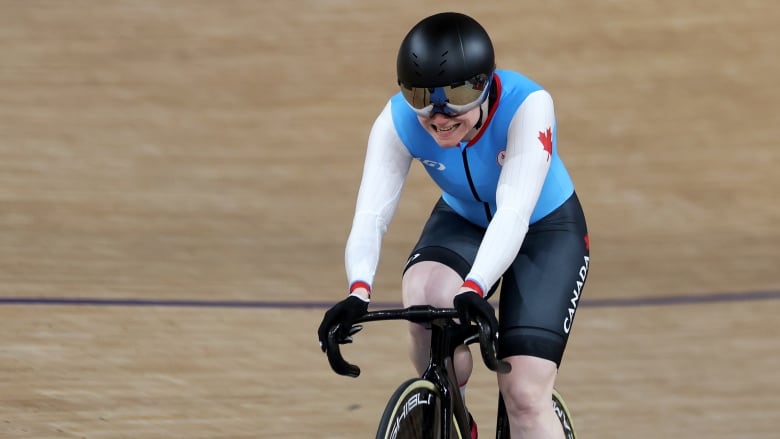How a life-altering accident led Canada’s Kate O’Brien from 2016 Olympics to Paralympic podium
Track cycling silver medallist says bike crash changed her outlook on life.

Canada’s Kate O’Brien smiles after racing to silver at the Tokyo Paralympics. Kiyoshi Ota, Getty Images
Myles Dichter, CBC Sports August 28, 2021
For Paralympic silver medallist Kate O’Brien, a simple trip outside the house was once considered a victory.
“Just being able to get back on a bike and ride to the grocery store to get Sour Patch Kids is more than I could have asked for,” O’Brien told CBC Sports.
Fast-forward to the 2020 Tokyo Paralympics, and the Calgary track cyclist placed second in the C4-5 500-metre time trial at her Games debut. She’ll also race in the road cycling time trial on Monday at 7 pm ET.
It was a long journey to the podium for O’Brien, 33, who competed in the 2016 Olympics before a 2017 crash on the velodrome left her with a serious brain injury, punctured lung, cracked ribs and broken clavicle.
To add to matters, O’Brien was also diagnosed with epilepsy in 2019.
“Looking back when I see myself four years ago, did I ever think that I would be competing at a Games, let alone standing on a podium? Absolutely not,” O’Brien said.
Yet here we are.
Rio did not produce the results O’Brien had hoped for as an able-bodied track cyclist, following her move from the bobsleigh team. She placed 13th in the keirin, 14th in the sprint and helped Canada finish eighth in the team sprint.
“Following 2016, I was in a bit of a post-Olympic slump, as you get into, and wasn’t super sure where I was going. And I thought that Tokyo, which was in the plan, that was what I was aiming for. I didn’t ever think that it would be in the Paralympics,” she said.
The accident was life-altering. It happened at home, in Calgary’s Glenmore Velodrome. When O’Brien’s rear tire gave out, she crashed into the pacer ahead of her and wound up in Foothills Medical Centre, where doctors told her she may never walk, ride a bike or even speak properly ever again.
Years of rehab followed. O’Brien says the transition from high-performance to recovery changed her outlook on life.
“Some of us are athletes and some of us are astronauts … but we’re all humans. I didn’t realize how many people there are who you can just talk with and be yourself with and have support from,” she said.
She says the crash and its ramifications taught her how to be vulnerable, something she struggled with previously.
That in turn helped O’Brien grow her relationship with former national track cycling team member Meghan Grant, whom she now calls her fiancée.
“I have kind of learned that it’s OK to be open with people and that it, in fact, makes you closer. It doesn’t make you seem like some whiny human or a person who complains that they don’t get their way. It actually just means that you’re interacting,” O’Brien said.
| Experience will live ‘forever’ |
And so, with her newfound lease on life, O’Brien hopped back on her bike and gradually moved from picking up candy to establishing world records.
She was reticent at first to move to Para cycling, admitting she didn’t know much about the sport or Paralympics in general — other than that Canada was all “one team.”
“But I didn’t realize what a division there is between able-bodied and para. Not in a mean way or bad way. It’s just there is like a very distinct division between the two,” she said, adding that she was now hoping to close that gap.
“That’s a huge thing I would love to get across is Para athletes are also just athletes. We’re all kind of the same.”
Her first major international competition was the 2020 world championships in Milton, Ont., where she set the world records and won gold medals to go with them.
That success set her up for Tokyo — though she still had to see it to believe it.
“Even when the team was officially named and I was on that list, I would still say that I didn’t believe that I was actually going to get to compete in the Paralympics. And honestly, probably at the velodrome, like when the race was starting, is the first time that I was like, Oh, you actually are competing at the Paralympics,” O’Brien said.
As for her personal medal hopes?
“The competitive nature really hoped to win gold or silver or bronze. But did it actually occur to me that that could really happen? Probably not until the medal was given to me,” she said.
And so when O’Brien stepped onto to the podium — and she insists that to this day she “did not expect this outcome” — she thought back to the route she took from disappointed Olympian to elated Paralympian.
“Medals are great, placings are great and records are great, but what does it all come down in the end? It’s always going to be a piece of metal on a ribbon. And it’s the experience that I’ve had that will be with me forever.”
![]() Source CBC Sports
Source CBC Sports
Also see
Despite horrific bike crash, Para-cyclist Kate O’Brien refuses to quit chasing her dreams CBC
Paralympic wake-up call: Canada’s flag-bearer and former Olympian win inspirational silvers CBC
